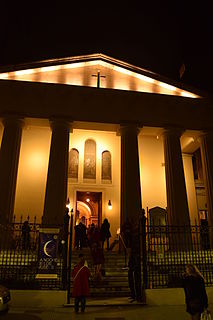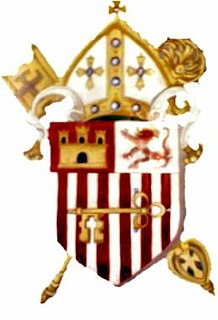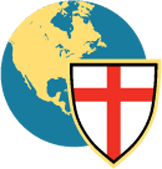The House of Bishops is the third House in a General Synod of some Anglican churches [1] and the second house in the General Convention of the Episcopal Church in the United States of America. [2]
The composition of a House of Bishops varies from jurisdiction to jurisdiction. Typically, they consist of archbishops and/or Primates, diocesan bishops and sometimes suffragan and coadjutor bishops (who may, in turn, be elected as a fixed number, as happens in the Church of England). Houses of Bishops of Anglican Communion provinces are typically chaired by the Primate, Archbishop, or Presiding Bishop of the province, while in some provincial subdivisions of a Communion province, a House of Bishops is chaired by a provincial metropolitan.

The Archbishop of Canterbury is the senior bishop and principal leader of the Church of England, the symbolic head of the worldwide Anglican Communion and the diocesan bishop of the Diocese of Canterbury. The current archbishop is Justin Welby, who was enthroned at Canterbury Cathedral on 21 March 2013. Welby is the 105th in a line which goes back more than 1400 years to Augustine of Canterbury, the "Apostle to the English", sent from Rome in the year 597. Welby succeeded Rowan Williams.

Since the 1990s, the Anglican Communion has struggled with controversy regarding homosexuality in the church. In 1998, the 13th Lambeth Conference of Anglican bishops passed a resolution "rejecting homosexual practice as incompatible with Scripture". However, this is not legally binding. "Like all Lambeth Conference resolutions, it is not legally binding on all provinces of the Communion, including the Church of England, though it commends an essential and persuasive view of the attitude of the Communion." "Anglican national churches in Brazil, South Africa, South India, New Zealand and Canada have taken steps toward approving and celebrating same-sex relationships amid strong resistance among other national churches within the 80 million-member global body. The Episcopal Church in the U.S. has allowed gay marriage since 2015." "Church of England clergy have appeared to signal support for gay marriage after they rejected a bishops' report which said that only a man and woman could marry in church." The Church of England's General Synod is set to discuss a diocesan motion "to create a set of formal services and prayers to bless those who have had a same-sex marriage or civil partnership". At General Synod in 2019, the Church of England announced that same-gender couples may remain married and recognised as married after one spouse experiences a gender transition provided that the spouses identified as opposite genders at the time of the marriage.
In the Anglican Communion, a suffragan bishop is a bishop who is subordinate to a metropolitan bishop or diocesan bishop and so is not normally jurisdictional in their role. Suffragan bishops may be charged by a metropolitan to oversee a suffragan diocese and may be assigned to areas which do not have a cathedral of their own.

In Christian churches with episcopal polity, the rank of metropolitan bishop, or simply metropolitan, pertains to the diocesan bishop or archbishop of a metropolis.
Primus inter pares is a Latin phrase meaning first among equals. It is typically used as an honorary title for someone who is formally equal to other members of their group but is accorded unofficial respect, traditionally owing to their seniority in office.
An ecclesiastical province is one of the basic forms of jurisdiction in Christian Churches with traditional hierarchical structure, including Western Christianity and Eastern Christianity. In general, an ecclesiastical province consists of several dioceses, one of them being the archdiocese, headed by a metropolitan bishop or archbishop who has ecclesiastical jurisdiction over all other bishops of the province.

The Anglican Church of Canada is the province of the Anglican Communion in Canada. The official French-language name is l'Église anglicane du Canada. In 2017, the Anglican Church counted 359,030 members on parish rolls in 2,206 congregations, organized into 1,571 parishes. The 2011 Canadian Census counted 1,631,845 self-identified Anglicans, making the Anglican Church the third-largest Canadian church after the Catholic Church and the United Church of Canada. Although Canada has no established church, the Queen of Canada's Canadian Royal Style continues to include the title of Defender of the Faith, albeit not in relation to any specific denomination, and the Canadian Monarch continues her countenance of three Chapels Royal in the Realm.

The Province of Canterbury, or less formally the Southern Province, is one of two ecclesiastical provinces which constitute the Church of England. The other is the Province of York. It consists of 30 dioceses, covering roughly two-thirds of England, parts of Wales, and the Channel Islands, with the remainder comprising continental Europe.
A presiding bishop is an ecclesiastical position in some denominations of Christianity.

In 2003, the Lambeth Commission on Communion was appointed by the Anglican Communion to study problems stemming from the consecration of Gene Robinson, the first noncelibate self-identifying gay priest to be ordained as an Anglican bishop, in the Episcopal Church in the United States and the blessing of same-sex unions in the Anglican Diocese of New Westminster. The Commission, chaired by Archbishop Robin Eames, published its findings as the Windsor Report on 18 October 2004. The report recommended a covenant for the Anglican Communion, an idea that did not come to fruition.

The Anglican Church of South America is the ecclesiastical province of the Anglican Communion that covers six dioceses in the countries of Argentina, Bolivia, Paraguay, Peru, and Uruguay.
The Province of the Episcopal Church of South Sudan, formerly known as Episcopal Church of Sudan, is a province of the Anglican Communion located in South Sudan. The province consists of eight Internal Provinces and 61 dioceses. The current archbishop and primate is the Most Rev'd. Dr. Justin Badi Arama. It received the current naming after the inception of the Province of the Episcopal Church of Sudan, on 30 July 2017.

The Anglican ministry is both the leadership and agency of Christian service in the Anglican Communion. "Ministry" commonly refers to the office of ordained clergy: the threefold order of bishops, priests and deacons. More accurately, Anglican ministry includes many laypeople who devote themselves to the ministry of the church, either individually or in lower/assisting offices such as lector, acolyte, sub-deacon, Eucharistic minister, cantor, musicians, parish secretary or assistant, warden, vestry member, etc. Ultimately, all baptized members of the church are considered to partake in the ministry of the Body of Christ.

The Episcopal Church in Cuba is the diocese consisting of the entire country of Cuba in The Episcopal Church. From 1966 to 2020, it was an extra-provincial part of the Anglican Communion. As of 2016, it had about 10,000 members in forty-six parishes, including the Cathedral of the Holy Trinity in Havana.
The Anglican realignment is a movement among some Anglicans to align themselves under new or alternative oversight within or outside the Anglican Communion. This movement is primarily active in parts of the Episcopal Church in the United States and the Anglican Church of Canada. Two of the major events that contributed to the movement were the 2002 decision of the Diocese of New Westminster in Canada to authorise a rite of blessing for same-sex unions, and the nomination of two openly gay priests in 2003 to become bishops. Jeffrey John, an openly gay priest with a long-time partner, was appointed to be the next Bishop of Reading in the Church of England and the General Convention of the Episcopal Church ratified the election of Gene Robinson, an openly gay non-celibate man, as Bishop of New Hampshire. Jeffrey John ultimately declined the appointment due to pressure.

The Anglican Church in North America (ACNA) is a Christian denomination in the Anglican tradition in the United States and Canada. It also includes ten congregations in Mexico, two mission churches in Guatemala, and a missionary diocese in Cuba. Headquartered in Ambridge, Pennsylvania, the church reported 30 dioceses and 1,037 congregations serving an estimated membership of 134,593 in 2017. The first archbishop of the ACNA was Robert Duncan, who was succeeded by Foley Beach in 2014.

Primates in the Anglican Communion are the most senior bishop or archbishop of one of the 41 churches of the Anglican Communion. The Church of England, however, has two primates, the Archbishop of Canterbury and the Archbishop of York.

The ordination of women in the Anglican Communion has been increasingly common in certain provinces since the 1970s. Several provinces, however, and certain dioceses within otherwise ordaining provinces, continue to ordain only men. Disputes over the ordination of women have contributed to the establishment and growth of progressive tendencies, such the Anglican realignment and Continuing Anglican movements.
The Anglican Church of Chile is the ecclesiastical province of the Anglican Communion that covers four dioceses in Chile. Formed in 2018, the province is the 40th and the newest in the Anglican Communion. The province consists of four dioceses. Its primate and metropolitan is the Archbishop of Chile, Tito Zavala.